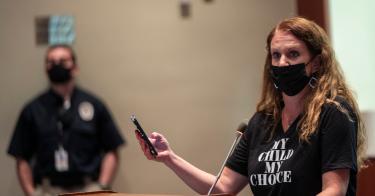A special interest group unfamiliar to many outside education circles has prompted Washington to investigate parents who attend school board meetings.
Parents and policymakers should be asking what this group is, where it gets its money from, and if its members agree with intimidating families. The answers will surprise you.
Attorney General Merrick Garland’s thinly veiled threat to families and community members attending board meetings in town halls around the country did not originate from the Justice Department. Rather, the National School Boards Association, the nation’s largest interest group for public school board officials, was sent to the White House just days before Garland’s missive.
>>> Attorney General Garland Abuses Power He Doesn’t Have to Threaten Parents
Without providing evidence that behavior at board meetings justified a federal investigation, Garland "directed the FBI and U.S. Attorney’s Offices to meet in the next 30 days" and "discuss strategies" for dealing with "harassment, intimidation, and threats of violence." He did so after the NSBA sent a letter to the White House asking for "extraordinary measures" to investigate parents and others attending meetings.
Public school boards nationwide pay dues annually to belong to state board associations and also the group, which has a liberal political agenda nearly indistinguishable from teachers unions. Large districts with more than 15,000 students pay more than $8,000 per year for their membership. The NSBA uses district resources—taxpayer money meant for students—to advocate for a slate of leftist causes including blocking school choice and lobbying for a larger federal footprint in local schools. It likes to micromanage school discipline policies, for example.
Quite a few parents have had quite a bit to say at board meetings on pandemic responses and critical race theory. This has surprised the NSBA. For years, unless an issue arises that signals a major shift in local school policies, school board meetings have been sparsely attended.
Earlier this year, the NSBA urged President Joe Biden’s administration to pursue policies that advance critical race theory in schools. The NSBA advocated for restoring the workforce diversity training that President Donald Trump’s administration had appropriately blocked in 2020. Whistleblowers found that these training sessions included messages that advocated for racial prejudice, such as telling white individuals that they oppress others because of the color of their skin and that they should apologize for their "white privilege."
The association also operates a program called "Dismantling Institutional Racism in Education," which the NSBA says "acknowledges that institutional, structural, and systemic racism has been ingrained in the history of America and throughout its public education system." These are ideas straight out of the critical race theory playbook.
As parents and community members have voiced opposition to these ideas, the NSBA and other interest groups have used intimidation and other coercive tactics to censor these engaged families. The Fairfax County, Virginia, school board recently filed a lawsuit against two mothers who posted public school information online that the parents obtained through a Freedom of Information Act request. School boards and their union allies in Rhode Island and Loudoun County, Virginia, have used similar tactics against parents speaking up at meetings or who made public records requests to find out what their children are learning.
>>> Biden’s Justice Department Clueless That Censoring Parents Is Sure to End Badly
Now, the state school boards in Florida, Montana, Delaware, Georgia, Louisiana, Missouri, North Carolina, and Virginia, some of which are members of the NSBA, have released statements opposing either the NSBA’s letter, increased federal involvement in local school board meetings, or both. According to Parents Defending Education, no state school board that issued a statement following the NSBA’s letter said they were consulted prior to the letter’s release.
The NSBA’s letter to the Biden administration and Garland’s memo distract attention from the pressure that special interest groups are applying to parents. Parents, we should remind ourselves, who are simply speaking up for their children. Many state school boards disagree with the NSBA’s intimidating tactics, and all school boards should reject federal interference with local education concerns. When special interest groups use taxpayer money to tell the federal government that parents are the enemy—the indefensible stance of the NSBA—something has gone terribly wrong.
This piece originally appeared in Washington Examiner





